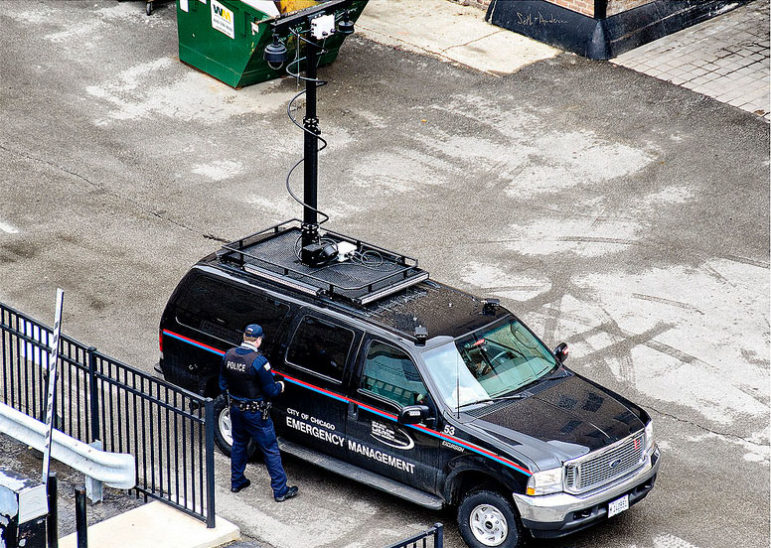
October 1, 2016; Fusion
Three recent stories about police conducting citizen surveillance outside of the oversight of their uniformed and civilian authorities have made the news in the past month. At the same time, some police forces have mounted active resistance to reform efforts.
In a story on the website Fusion, “Chicago cops have a huge, secret slush fund,” author Sam Stecklow reveals the existence of a police slush fund, outside of civilian control and fueled by the controversial practice of civil forfeitures.
Most notably, between 2010 and 2015, the CPD spent nearly $2 million on surveillance technology, including StingRays and license plate readers. Police departments routinely use StingRay technology to spy on activists and protesters, and Chicago’s is no different. Chicago police have been caught discussing their use of StingRays to monitor Black Lives Matter protesters’ phones over police scanners.
Chicago’s killings of unarmed African American men and the revelations of police torture create a culture of corruption, into which this latest story disturbingly fits.
These revelations come on the heels of the story in August about aerial surveillance of the city of Baltimore by Baltimore Police, an agency that is already under fire for incidents involving police misconduct, including the death of Freddie Gray. Bloomberg News reported, “Since the beginning of the year, the Baltimore Police Department had been using the plane to investigate all sorts of crimes, from property thefts to shootings. The Cessna sometimes flew above the city for as many as 10 hours a day, and the public had no idea it was there.”
As in Chicago, the surveillance program was not part of the Department’s budget so it was beyond the control of local elected officials. According to the Baltimore Sun:
[Mayor] Rawlings-Blake wasn’t the only top official who didn’t know about the program. Officials at all levels of government were in the dark. A spokesman for Gov. Larry Hogan said the governor was unaware of the program. Members of City Council, the city’s General Assembly delegation and the state’s congressional delegation also were uninformed.
Sign up for our free newsletters
Subscribe to NPQ's newsletters to have our top stories delivered directly to your inbox.
By signing up, you agree to our privacy policy and terms of use, and to receive messages from NPQ and our partners.
Unlike Chicago’s use of civil forfeiture funds, Baltimore police were beneficiaries of a grant from a donor-advised charity to finance their program. Your “tax expenditure” dollars at work.
In another recent story, this one from the Associated Press, investigative journalists Sadie Gurman and Eric Tucker found hundreds of examples of disciplinary actions against officers who used police records to promote their off duty interests, some personal and some private policing assignments.
The AP, through records requests to state agencies and big-city police departments, found law enforcement officers and employees who misused databases were fired, suspended or resigned more than 325 times between 2013 and 2015. They received reprimands, counseling or lesser discipline in more than 250 instances, the review found.
Yet while police abuse of citizens’ rights continues to proliferate, police resistance to calls for reform grows. This past week, Cleveland’s rank and file police overwhelmingly voted to endorse presidential candidate Donald Trump. Keep in mind that CPD serves a majority minority community and is under a Department of Justice Consent Decree resulting from many questionable deaths of unarmed African American citizens. The Plain Dealer reports:
Several officers…predict that the union’s vote to endorse Trump, whose hardline stances on policing and immigration have sparked outrage and fear within black and Latino communities, will further erode the relationship between Cleveland’s police officers and minority communities.
Understatement of the week.
In another show of rank and file impunity, Pittsburgh’s police union leaders held a vote of “no confidence” in their chief, Cameron McLay, who was brought to Pittsburgh to reform a scandal-ridden department. Chief McLay is best known nationally for appearing in uniform at a citizen’s rally holding a sign that read, “I resolve to challenge racism @ work #end white silence.” But it was Chief McLay’s participation in a panel discussion on community policing at the Democratic National Convention that triggered the no-confidence vote. With support from Pittsburgh’s progressive mayor, Bill Peduto, the chief’s job is secure for now.
The steady stream of news stories about police abuse and questionable tactics seems to have emboldened beat cops to push back against their uniformed and civilian leaders in the guise of political action. Looking past the raw feelings of a divisive presidential campaign, police reformers need to figure out how to drain the politics from the practice of police demilitarization.—Spencer Wells










